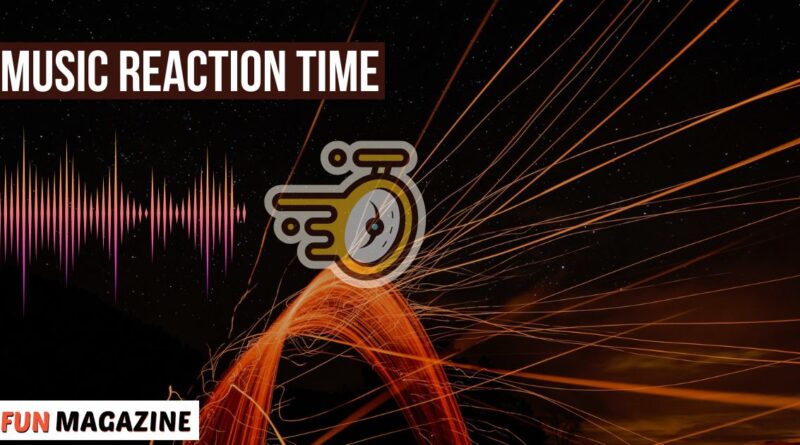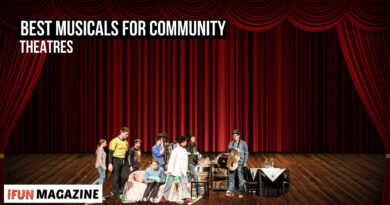Reaction time is the time it takes for your brain to respond to something. For example, your reaction time is at work when you catch a ball before it hits the ground. Music can improve how fast you react.
Research shows that listening to fast-tempo music can make your brain more active and help you respond quicker in various situations. Whether playing sports, gaming, or staying focused, music can boost your reaction time in fun and effective ways.
Keep reading to learn how music influences your reactions and how you can use it.
What is Reaction Time?
Reaction time is how quickly your brain and body respond to a stimulus. It begins when something, like sound, sight, or touch, triggers your senses. Your brain processes the signal and sends it to your muscles for action. For example, catching a falling ball shows your reaction time in action.
Everyone has their reaction time, which can be faster or slower based on various factors. A rapid reaction time means you can respond quicker in situations like avoiding danger. It’s an essential skill for everyday life, especially in activities requiring quick decisions.
Types of Reaction Time
1. Simple Reaction Time
Simple reaction time happens when there’s only one stimulus to respond to. For example, pressing a button when a light appears is a simple reaction time. It’s the fastest type because there are no multiple choices to make. Your brain only has to detect and respond to a single action.
2. Choice Reaction Time
Choice reaction time involves picking between several stimuli and responding to the correct one. For example, if driving a car, you must press the brake or gas pedal, depending on the situation. This type requires more thought and is slightly slower than simple reaction time.
3. Discrimination Reaction Time
Discrimination reaction time involves responding only to specific stimuli while ignoring others. For example, focusing on a green traffic light and ignoring red or yellow ones highlights this type of reaction time. This requires your brain to take longer to decide which action to take.
Factors Influencing Reaction Time
Several factors can speed up or slow down reaction time.
- Age: Reaction time often slows down as people grow older.
- Health: Healthy physical and mental conditions improve how quickly you can react.
- Environment: Distractions like noise or poor lighting can slow your reaction time.
- Practice: Repeating tasks like gaming or sports helps you respond quicker over time.
- Sleep: Lack of sleep can make your brain process information more slowly.
You can improve your reaction time by staying healthy, practicing, and managing distractions.
Importance of Reaction Time
Reaction time plays a significant role in many parts of daily life. Quick reactions help you stay safe, like stopping a car to avoid an accident. It’s also essential in sports, where fast decisions can improve performance.
For gamers, lightning-fast reflexes can mean winning or losing in competitive matches. Drivers rely on reaction time to prevent accidents on the road. Even in simple tasks like catching a falling object, reaction time helps you act without delay.
Practicing and improving your reaction time can make you more effective and confident in many activities.
Science Behind Music and the Brain
Music has a powerful effect on the brain, triggering different emotional responses. Hearing music activates the auditory cortex, which processes sound quickly in the brain. Scientists found that listening to music can release dopamine, the “feel-good” chemical.
This release of dopamine improves focus and lifts mood, enhancing mental clarity. Research also shows that music strengthens brain areas involved in memory and attention processing. Specific tunes can help people concentrate better by stimulating neural activity in the brain.
Studies reveal listening to upbeat music can improve task performance and creativity. Slow music, on the other hand, helps with relaxation and reducing stress levels. Musical training boosts cognitive skills like problem-solving and critical thinking.
Researchers found that students who learn instruments score higher in math and reading tests. Music therapy is also used in health care to support mental well-being and recovery. The brain responds uniquely to music, making it a universal tool for positive change.
How Music Impacts Reaction Time

Positive Effects
Fast-tempo music improves alertness and helps people react quickly to tasks. Rhythmic beats in music enhance coordinated movements, making physical actions more precise. Listening to upbeat music boosts energy levels, improving focus and activity speed.
Fast-tempo songs stimulate the brain and help it process information rapidly. Electronic dance music with quick beats enhances reaction time and alertness.
Classical music with fast tempos sharpens focus and supports faster decision-making under pressure. The rhythm in music contributes to better timing in activities like dancing or sports.
People use energetic music during workouts to increase motivation and improve their movements. Quick-paced music enhances reflexes, making gaming, sports, or driving beneficial.
Fast rhythms synchronize with the brain, helping muscles respond more effectively and promptly.
Negative Effects
Overly loud or distracting music might slow reaction times and cause unnecessary delays. Complex compositions confuse the brain, making it harder to complete tasks efficiently.
Like ambient music, slow-tempo songs can decrease energy, making responses slower. Excessively dramatic or layered music distracts focus from critical tasks, impairing performance. Too much background noise, even from music, disrupts the brain’s ability to process quickly.
Heavy bass or inconsistent rhythms affect coordination during high-speed or fast-paced tasks. Ambient or instrumental music with slow tempos can produce a calming effect, but delays focus.
Distracting music with unpredictable patterns interrupts the brain’s normal processing speed during activities. Loud and chaotic tracks overwhelm the ears, slowing the response by causing mental overload. Adverse effects of music arise when it lacks structure or harmony for brain coordination.
Practical Applications of Music to Enhance Reaction Time
For Athletes
Motivational playlists can improve focus and reaction time during sports activities. Fast-tempo music helps athletes maintain energy and respond quickly. Research shows upbeat songs improve precision in high-stress sports like sprinting or tennis.
Many runners select songs with steady beats to match their running speed. A swimmer interviewed mentioned using energizing tracks to prepare for competitions. Studies reveal that rhythmic music enhances consistency in team sports, improving coordination.
Music creates a mental rhythm, helping athletes time movements more effectively under pressure. Coaches often use motivational music during practice to boost player morale and reaction speeds.
For Gamers
Gamers use curated music playlists to sharpen their focus during intense gaming sessions. Background music helps players stay alert and responsive in competitive environments. Studies show that consistent beats in songs improve multitasking during complex gameplay.
Interviews with competitive gamers reveal ambient music reduces stress and improves reaction capacity. Soundtracks with minimal lyrics help players avoid distractions while maintaining in-game awareness.
Fast-paced tracks support quick decision-making in high-speed racing or shooting games. Low-volume electronic music improves concentration without overwhelming the senses.
For Daily Life
Selecting the right music helps with everyday activities like driving, exercising, and studying. Fast-beat songs enhance reaction time when listening while doing high-energy workouts.
Driving playlists with comfortable tempos support focus without causing distractions on the road. Many students use calm instrumental music to concentrate better and complete homework on time.
High-energy tracks boost motivation and performance during weightlifting or cardio workouts. Relaxing tunes help people stay calm and maintain reaction times during stressful driving.
Research and Case Studies
Numerous studies explore how music affects reaction times in different situations. Researchers conducted experiments using various music genres to observe their impact on participants’ focus levels.
One notable study found that fast-tempo music significantly enhanced reaction speed during video games. Participants responded more quickly to visual cues while upbeat tracks played in the background.
Another experiment tested the effect of calm instrumental music on problem-solving tasks in quiet environments. Results showed that participants maintained steady focus and completed tasks faster using calm music.
Further studies highlight music’s application in sports psychology to improve athletes’ mental performance. For example, sprinters trained with high-energy soundtracks shaved seconds off their times.
Similarly, rehabilitation centers use music therapy to help patients improve reaction times post-surgery. Music activates brain pathways, promoting better coordination and focus in recovery processes.
Tips for Using Music to Optimize Reaction Time
Choosing the Right Music
Select music with a tempo matching the activity’s pace for better focus. Faster beats can enhance reactions during gaming or high-energy tasks. Calm, instrumental tracks work well for concentration during study or problem-solving.
Choose music genres that inspire you or positively affect your mood. Personal preference plays a crucial role in how effective music can be. Experiment with different tempos or styles to find what improves your reactions.
Creating Playlists for Specific Activities
Build custom playlists designed for your goals, like driving or exercising. Upbeat playlists can improve alertness during long drives and keep you focused. Gaming playlists with fast-tempo music make reaction times quicker and sharper.
Use apps and websites to help you find songs tailored to your needs. Look for playlists created by others for specific tasks for additional inspiration. Regularly update your playlists to keep them engaging and fresh.
Avoiding Pitfalls
Avoid music with lyrics if they distract you or lower your focus levels. Playing music too loud can overwhelm your thoughts and slow your reactions. If it becomes counterproductive, turn off music during tasks requiring full concentration.
Learn when silence is more effective than background tunes, like during meetings. Remember, music should enhance your performance and not distract or reduce energy levels.
Conclusion
Music can affect how fast or slow your reactions are in different situations. Use upbeat music to boost your energy, and try soft tunes for calm focus. Avoid listening to distracting music, especially during tasks that require your full attention.
Experiment with many genres to find what best suits your work or study needs. Keep your volume moderate, as loud music can lower your ability to concentrate. Everyone reacts to music differently, so explore what improves your performance most effectively.
Remember, music can be a helpful tool if used correctly. Try fast tempos when you need motivation or slower ones when relaxing. Use music carefully to improve focus, energy, and productivity while avoiding distractions.
FAQs
How does music impact reaction time?
Music can help improve reaction time by increasing alertness and attention during tasks.
Do musicians have a faster reaction time?
Yes, musicians often have faster reaction times due to regular practice and coordination.
Can music constantly improve reaction time?
No, music may not constantly improve reaction time and could distract in some situations.
What genres of music are most effective for enhancing reaction speed?
Upbeat genres like pop or electronic music can enhance reaction speed and focus.
Does listening to music while multitasking affect reaction time differently?
Yes, multitasking with music can sometimes slow reaction time, depending on the task’s difficulty.



